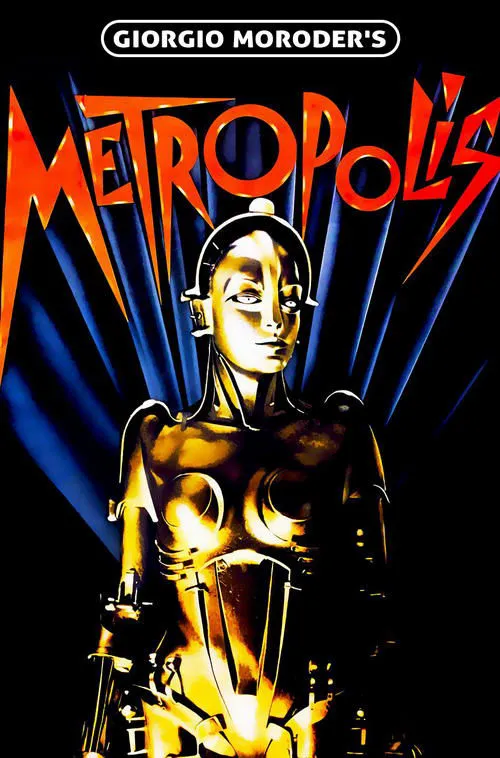Giorgio Moroder's Metropolis

Plot
The 1984 version of Metropolis, supervised by the renowned composer Giorgio Moroder, stands as a testament to the enduring influence of Fritz Lang's 1927 science fiction masterpiece. Lang's pioneering film is a cautionary tale of a dystopian future, where class divisions run deep and technological advancements are wielded as instruments of oppression. In the city of Metropolis, a towering metropolis constructed by the brilliant but unscrupulous scientist Rotwang, the ruling class, led by the tyrannical Joh Fredersen, resides atop the city's magnificent edifices, living in splendor and indulgence. However, this utopian world exists in stark contrast to the squalid existence of the working class, known as the 'Eternal Suffering' or 'Underworld', who toil beneath the city's surface, living in cramped and squalid conditions. Against this backdrop of contrast and inequality, a young Freder Bremen, the son of Joh Fredersen, begins to question the morality of his father's rule. Despite the fact that Joh Fredersen treats him coldly and with disdain, Freder develops a deep affection for the workers and becomes increasingly sympathetic to their plight. His fascination with the 'Eternal Suffering' stems from his interactions with Maria, a stunningly beautiful woman and leader of the workers, who speaks passionately of a more equal future. Meanwhile, Rotwang, a genius in his field and a nemesis of Joh Fredersen, manipulates the latter into making critical decisions by creating a robotic double of Maria. This android replica convinces the masses that Maria has become disillusioned with the workers and now advocates for the rule of the wealthy elite. As riots break out in the 'Eternal Suffering' and confusion spreads throughout the Underworld, Joh Fredersen capitalizes on the chaos by exploiting the situation to further solidify his power grip over the city. Freder, disenchanted with his father's actions, sets out to expose the truth behind the android Maria's manipulations. Along with Maria, who eventually learns of the deceit perpetrated against her, Freder concocts a plan to rescue the innocent workers trapped in the city's labyrinthine underbelly and overthrow the corrupt Joh Fredersen regime. Giorgio Moroder's 1984 version, a collaborative effort involving film archivists from across the globe, features a meticulously restored print of Lang's original, with enhanced colors and fewer intertitles to provide a more immersive experience for modern viewers. Furthermore, Moroder's innovative and synth-driven score perfectly complements the original film's narrative while incorporating six catchy pop songs by notable artists of the early MTV era. Freddie Mercury, with his powerful vocals and theatrical showmanship, lends his voice to the song 'The Future's in the Air', while Pat Benatar contributes the hit single 'Hell Hath No Fury Like a Woman Scorned' for the pivotal scene where Maria confronts her own android double. Adam Ant contributes the song 'Kingdom Coming', which plays as the android Maria spreads her subversive message to the bewildered Underworld workers. The music by the artists serves not only to enhance the emotional depth of key scenes but also to provide an engaging musical narrative, further emphasizing the themes of rebellion and social upheaval inherent in Lang's Metropolis. Ultimately, Lang's groundbreaking Metropolis serves as a timeless critique of social stratification and the consequences of unchecked scientific progress, reminding viewers of the enduring importance of compassion, equality, and collective action.
Reviews
Recommendations




